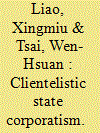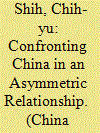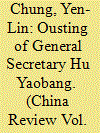| Srl | Item |
| 1 |
ID:
163449


|
|
|
|
|
| Summary/Abstract |
United front work has played an important role in the history of the
Chinese Communist Party (CCP). Since 2012, Xi Jinping has strengthened the united front system’s e�cacy and further proposed formation
of a “great united front.” He holds that united front work’s essence is
“making friends,” in which regard the CCP under Xi has introduced a
new practice called “pairing-up.” It stipulates that local governments at
all levels must facilitate establishment of “friendly” relations between
members of Party committees and specific persons in charge of
so-called democratic parties to further implementation of united front
work. This new form of united front embodies “clientelistic state
corporatism.” We use the case of L City to analyze the united front
model of pairing-up, its e�ects and limitations, and the CCP’s social
control strategy
|
|
|
|
|
|
|
|
|
|
|
|
|
|
|
|
| 2 |
ID:
163450


|
|
|
|
|
| Summary/Abstract |
�is study seeks to explain how a weaker party could decide on its own
to confront a stronger party. �e weaker party relies on relational turn
in international relations to provide an alternative to the realist view.
On the basis of relational turn, which stresses the importance of
discovering the processual mechanisms of behavior instead of the
structure or corelationship among variables, this study o�ers an empirically based speculation of the plausible psychological mechanisms that
enable a weaker party in Taiwan to resort to confrontation against a
stronger party in China. �ese psychological mechanisms are arguably
necessary processes that lead to confrontational policy. This study
argues that a small party is epistemologically equal to its stronger
counterpart in relational coupling. �is assumption is based on prior
understandings that constitute the identities of both parties. The
former exerts agency for confrontation when acting upon the senses of
e�cacy, determination, and/or legitimacy that are embedded in relational coupling.
North Korean Leader Kim Jung Un executed his uncle Jang Song-thaek
for treason on 13 December 2013. �e execution was conducted in the
most theatrical fashion and was seemingly designed for the entire world
to see. Jang was a top-ranking pro-China veteran who believed in the
Chinese style of reform. A year before, Jang was still collaborating with
|
|
|
|
|
|
|
|
|
|
|
|
|
|
|
|
| 3 |
ID:
163451


|
|
|
|
|
| Summary/Abstract |
With the support of Party elders led by Deng Xiaoping, Hu Yaobang
assumed the top position in the Chinese Communist Party (CCP). �is
article examines the roles played by the powerful “revolutionary elders”
in Hu’s dismissal from the post of CCP General Secretary in early
1987. Special attention is paid to the role of Peng Zhen. �is detailed
study furthers our understanding of the nature and operations of
Chinese elite politics in the Deng era, and of the complex generational
relations between the old revolutionaries and the successor generation
of leaders.
Deng Xiaoping (鄧小平), Chen Yun (陳雲), Peng Zhen (彭真), and others
among the post-Mao Party elders had been in�uential statesmen in the
People’s Republic of China (PRC) during the pre–Cultural Revolution
|
|
|
|
|
|
|
|
|
|
|
|
|
|
|
|